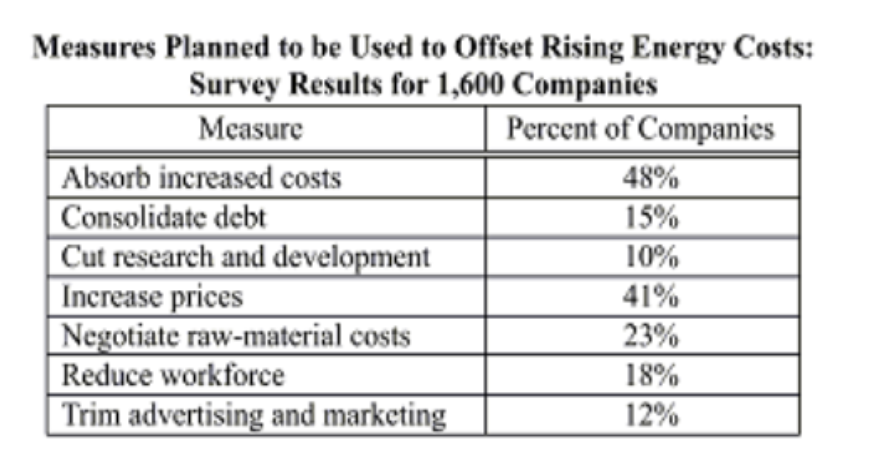下面是GRE数学里面有一个很经典的难题,大部分刚接触这考试的同学都会做错。
Of the students in a school, 20 percent are in the science club and 30 percent are in the band. If 25 percent of the students in the school are in the band but are not in the science club, what percent of the students who are in the science club are not in the band?
通过画韦恩图,标注相关数据,一般也能算出全校学生中有15%在science club而不在band,但最终答案却是75%。
关键在于题目的问法,what percent of the students who are in the science club are not in the band按照严格的翻译应该是“在科学俱乐部的学生里有百分之多少不在乐队?”
所以这时候的百分比是占科学俱乐部这个小范围的百分比。假设全校是x人,科学俱乐部就是20%x,只在科学俱乐部不在band的有15%x,这15%x占20%x的比例就是0.15x/0.2x=0.75。
这个题能比较明显地看出在GRE里面百分比的考法,最关键的是看清楚percent of后面的完整概念,分清楚比如到底是前面的the students in the school还是后面的the students who are in the science club。
类似的考法在图表题里更是常见。
比如有个题,给你下图,然后问An analyst estimates that of the companies surveyed that plan to increase prices, 75 percent will actually increase prices. According to the analyst’s estimate, what is the number of companies surveyed that plan to increase prices but will not actually increase prices?

这题的关键是75%的基数。这次出现在前面的of the companies但是注意后面还有限定是that plan to increase prices。一共是1600,有41%的打算提价,所以基数是1600*41%。在此基础上有75%的会正经提价,也就意味着有25%是打算提价而不会正经提价的,也就是1600*41%*25%=164。
这个知识点对ETS来说有多重要呢,不止数学会考,它甚至还会出现在verbal里面。
Legislator: The government funds a program that aims to increase populations of the merset, an endangered mammal, by taking mersets into captivity and keeping them in an environment where they can safely produce and raise offspring. Yet only 15 percent of mersets born in captivity and released into the wild survive their first winter, whereas 25 percent of mersets born in the wild survive their first winter. The program is there fore unlikely to achieve its goal.
Which of the following. if true, most seriously weakens the legislator 's argument?
- In any given year, only about half of the mersets that reach breeding age that year are captured to be bred in captivity.
- Some wild mammal populations increased as a result of similar programs, even though the mammals born in captivity had less than a 15 percent survival rate for the first winter after their release.
- A breeding-age merset in captivity is more likely to breed than one in the wild.
- Of the mersets that survive their first winter in the wild, most survive long enough to breed.
- The average litter size of mersets that breed in captivity is no smaller than that of mersets that breed in the wild.
文章论证的关键是人类的干预可能反而导致存活率降低,所以可能适得其反,达不成增加数量的目的。这里前提讨论的是比例,结论关心的是数量。同样要考虑基数的问题。可能以前存活率25%,基数是100,这样存活25个。现在存活率只有15%,确实更低,但基数可能正如正确答案C说的那样变大了,就是生得更多,比如假设是200个,这样存活30个,存活数量比之前是有增加的,就可以削弱原文论证。
C 正确就在于指出了从比例到绝对数量这种论证常见的漏洞在于忽视了基数的变化。
顺便说一下最好的错误答案B错在哪里。B首先是some的问题,只有要一个都可以算some,而这“一个”或者“一些”可以增加并不直接影响到merset会不会增加。如果改成most,表示一半以上,这样B可能会更好。
B更大的问题在于这些存活率低于15%的增加了数量并不能类比到merset的情况。因为merset的困境,或者说作者的论证关键是干预后存活率低于干预前的存活率,而不是绝对的15%本身有什么不好。这样就可能B选项里说的那一些在15%的情况下增加数量的仅仅是因为不干预的情况下存活率可能只有5%,这样干预之后存活率变高,相应数量变高就是很正常的事情。
它们能行,而面临存活率变低困境的merset未必能行。这也是常见的想要通过类比去论证结论答案的问题所在,就是简单的一句话很多时候很难说清楚这里面提到的情况确实跟原文说的情况是相似的,而且这个相似性还要对结论有影响。这也是为什么在逻辑题里面,比较少选通过类比去加强论证的选项。












